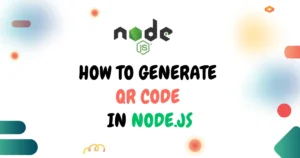Node.js developers who want to build fast, scalable, and efficient applications should know the Top 20 Node.js Packages Every Developer Should Master. These essential packages simplify common tasks, enhance application performance, and make development setups smoother.
In this guide, we will explore each of these must-know Node.js packages with practical examples and explanations, helping developers understand how to use them effectively in real-world projects.
1. Express
Express is a lightweight and flexible web framework for Node.js that simplifies building APIs and web applications. It provides robust routing, middleware support, and easy integration with databases and authentication systems. Express is ideal for small projects as well as enterprise-level applications due to its simplicity and extensibility.
const express = require('express')
const app = express()
app.get('/', (req, res) => res.send('Hello Developer'))
app.listen(3000)This example sets up a basic server and a route, showing how Express handles HTTP requests easily.
2. Fastify
Fastify is a modern Node.js web framework designed for high performance and low overhead. It features a schema-based validation system and built-in plugins for logging and security. Developers often choose Fastify for APIs that need to handle large volumes of requests efficiently.
const fastify = require('fastify')()
fastify.get('/status', async () => ({ status: 'ok' }))
fastify.listen({ port: 3000 })This demonstrates creating a fast, minimal server capable of handling HTTP requests efficiently.
3. NestJS
NestJS is a TypeScript-first framework that emphasizes modularity and scalability. It uses decorators and dependency injection to help organize complex applications into reusable modules. NestJS is ideal for building enterprise-grade applications and REST or GraphQL APIs.
import { Controller, Get } from '@nestjs/common'
@Controller('health')
export class AppController {
@Get() check() { return { status: 'ok' } }
}This example shows a simple health check endpoint using NestJS modular structure.
4. Helmet
Helmet enhances the security of Node.js applications by setting HTTP headers that prevent common vulnerabilities. It protects against attacks such as cross-site scripting, clickjacking, and content sniffing.
const express = require('express')
const helmet = require('helmet')
const app = express()
app.use(helmet())This adds default security headers to your application automatically.
5. CORS
CORS (Cross-Origin Resource Sharing) allows controlled access to resources from different domains. It is crucial when APIs are consumed by front-end applications hosted on separate origins.
const express = require('express')
const cors = require('cors')
const app = express()
app.use(cors())This enables your API to be accessed securely from multiple domains.
6. Bcrypt
Bcrypt provides secure hashing for passwords and sensitive data. It helps prevent security breaches by storing passwords in a hashed form rather than plain text.
const bcrypt = require('bcrypt')
bcrypt.hash('secret123', 10).then(console.log)This example hashes a password before storing it, enhancing security for user data.
7. JSONWebToken (JWT)
JWT allows token-based authentication in Node.js apps. It is widely used for session management and API security.
const jwt = require('jsonwebtoken')
const token = jwt.sign({ user: 'admin' }, 'key', { expiresIn: '1h' })
console.log(token)This creates a secure token that can be used for authenticating users across requests.
8. Passport.js
Passport.js is an authentication middleware supporting strategies like OAuth, local, and social logins. It simplifies integrating secure login systems into Node.js applications.
const passport = require('passport')
app.use(passport.initialize())This sets up Passport for authentication middleware in your application.
9. Mongoose
Mongoose provides a schema-based solution to model MongoDB data in Node.js applications. It enables validation, middleware, and relationships between collections.
const User = mongoose.model('User', { name: String })
new User({ name: 'John' }).save()This creates and saves a user document in MongoDB with minimal setup.
10. Prisma
Prisma is a modern ORM that provides type-safe database queries. It supports SQL and NoSQL databases and simplifies database management for complex applications.
await prisma.user.create({ data: { name: 'Alice' } })It will creates a new user record while ensuring type safety and correct database structure.
11. Sequelize
Sequelize is a promise-based ORM for SQL databases like PostgreSQL, MySQL, and SQLite. It allows defining models, relationships, and queries efficiently.
const User = sequelize.define('User', { username: DataTypes.STRING })
User.sync()Above example will sets up a model and syncs it with the database automatically.
12. Zod
Zod is a TypeScript-first validation library that ensures API input is consistent and correct. It integrates well with modern frameworks.
const schema = z.string().email()
schema.parse('admin@example.com')This validates that input is a correctly formatted email address.
13. Validator.js
Validator.js provides functions for string validation, such as emails, URLs, and more. It is widely used in form validation and API data checking.
console.log(validator.isEmail('test@example.com'))Same as zod it will check email is valid or not but with lesser syntax.
14. UUID
The UUID generates globally unique identifiers for users, sessions, and records. It is crucial in distributed systems. It’s used for security purposes.
console.log(uuidv4())As result of above example, you will see and unique generated id each time.
15. Axios
Axios is a widely used HTTP client for Node.js that simplifies making requests to external APIs and services. It supports promises and works seamlessly with async/await, making asynchronous operations easier to handle. Axios automatically transforms JSON data, handles request cancellation, and supports custom headers, authentication, and interceptors. Developers frequently use Axios for fetching data from third-party APIs.
axios.get('https://api.github.com').then(res => console.log(res.data))This example fetches data from the GitHub API and logs it, showing how Axios makes HTTP requests simple, fast, and reliable for real-world applications.
16. Got
Got is a modern and lightweight HTTP request library optimized specifically for Node.js. It offers faster performance and smaller footprint compared to some older clients, while supporting promises and async/await. Got also supports streaming, retries, timeouts, and hooks, making it ideal for handling API requests efficiently in real-world applications.
const response = await got('https://api.github.com')
console.log(response.body)This example demonstrates fetching data from an API with minimal boilerplate, highlighting Got’s simplicity and speed for Node.js applications.
17. Socket.IO
Socket.IO enables real-time, bidirectional communication between clients and servers. It simplifies building chat applications, live notifications, collaborative tools, and other interactive applications. With automatic re-connection, fallback support, and event-based communication, Socket.IO is a go-to library for implementing real-time functionality in Node.js.
io.on('connection', socket => socket.emit('message', 'Welcome'))This sends a real-time welcome message to each connected client, showing how easy it is to implement live communication.
18. Pino
Pino is a fast, low-overhead JSON logger for Node.js. It provides structured logging that is optimized for performance, making it ideal for production environments. Developers use Pino to track server activity, debug issues, and integrate logging with monitoring tools efficiently.
pino.info('Server started')This example logs a structured message indicating server startup, demonstrating how Pino can be used for monitoring application behavior.
19. Morgan
Morgan is an HTTP request logger middleware for Node.js, widely used in Express applications. It logs incoming requests in a readable format, which is helpful for debugging, performance tracking, and analyzing traffic. Morgan supports different logging formats and can be extended to suit custom logging needs.
app.use(morgan('dev'))This example logs all incoming HTTP requests in a concise format, providing insight into server activity and helping identify potential issues.
20. Sharp
Sharp is a high-performance image processing library for Node.js that allows resizing, converting, and optimizing images quickly. It supports multiple formats, streaming, and advanced operations like cropping and rotation. Sharp is essential for applications handling images at scale, improving performance and reducing load times for web and mobile projects.
sharp('input.jpg').resize(200).toFile('output.jpg')This example resizes an image efficiently, showing how Sharp simplifies image optimization for web applications.
Conclusion
Mastering these top 20 Node.js packages ensures developers can build fast, scalable, and reliable applications. Tools like Express, Fastify, and NestJS handle server setup, while Prisma and Mongoose simplify database management. Packages like Socket.IO, Pino, and Sharp improve real-time functionality, monitoring, and media processing. Learning these packages equips you with the essential skills for a professional Node.js setup and integration.
Curious about the most popular tools for building modern web applications? Check out our detailed blog post on Top 10 JavaScript Frameworks to explore their features, strengths, and how they can help you speed up development.



